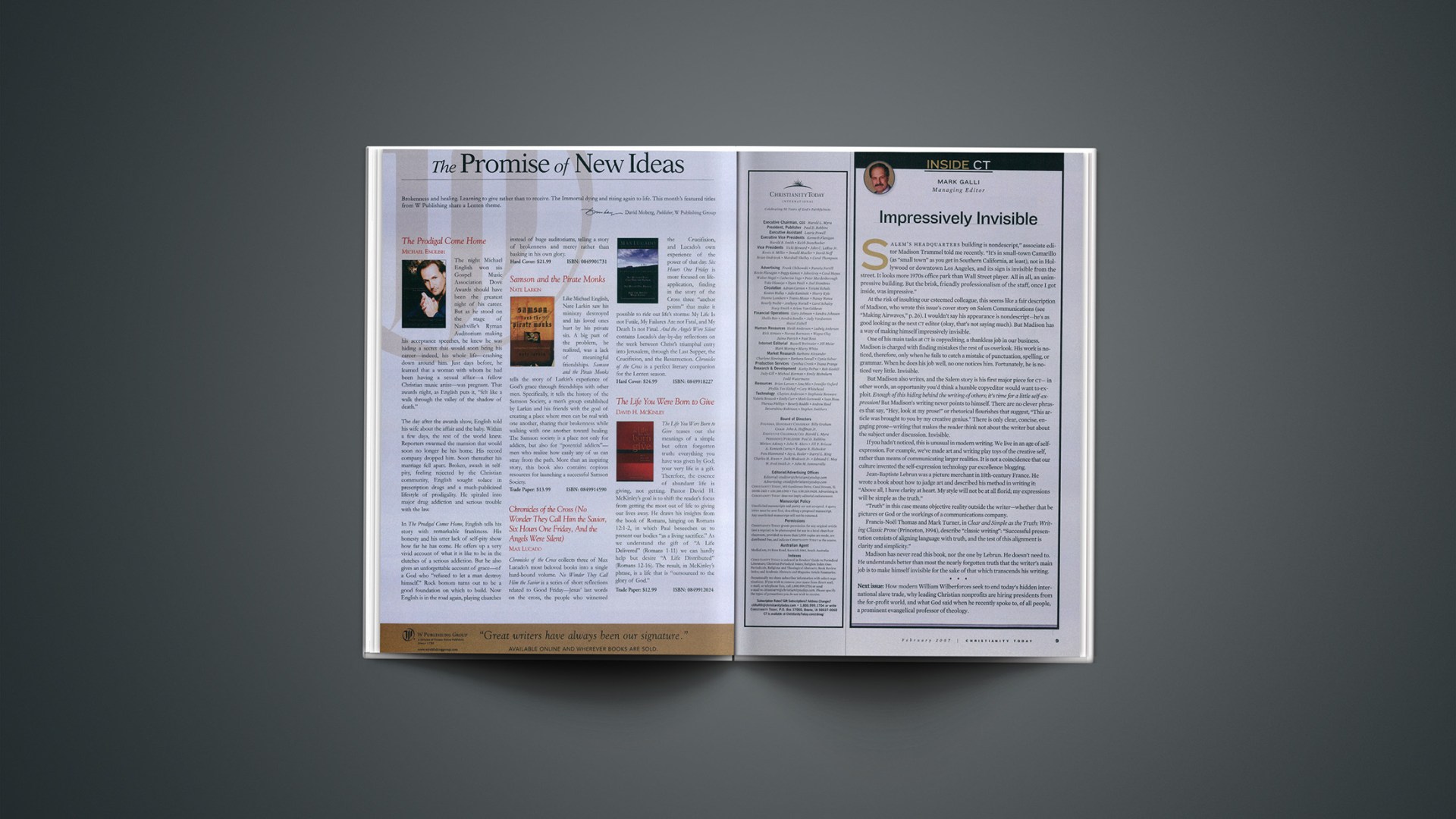“Salem’s headquarters building is nondescript,” associate editor Madison Trammel told me recently. “It’s in small-town Camarillo (as “small town” as you get in Southern California, at least), not in Hollywood or downtown Los Angeles, and its sign is invisible from the street. It looks more 1970s office park than Wall Street player. All in all, an unimpressive building. But the brisk, friendly professionalism of the staff, once I got inside, was impressive.”
At the risk of insulting our esteemed colleague, this seems like a fair description of Madison, who wrote this issue’s cover story on Salem Communications (see “Making Airwaves,” p. 26). I wouldn’t say his appearance is nondescript—he’s as good looking as the next CT editor (okay, that’s not saying much). But Madison has a way of making himself impressively invisible.
One of his main tasks at CT is copyediting, a thankless job in our business. Madison is charged with finding mistakes the rest of us overlook. His work is noticed, therefore, only when he fails to catch a mistake of punctuation, spelling, or grammar. When he does his job well, no one notices him. Fortunately, he is noticed very little. Invisible.
But Madison also writes, and the Salem story is his first major piece for CT— in other words, an opportunity you’d think a humble copyeditor would want to exploit. Enough of this hiding behind the writing of others; it’s time for a little self-expression! But Madison’s writing never points to himself. There are no clever phrases that say, “Hey, look at my prose!” or rhetorical flourishes that suggest, “This article was brought to you by my creative genius.” There is only clear, concise, engaging prose—writing that makes the reader think not about the writer but about the subject under discussion. Invisible.
If you hadn’t noticed, this is unusual in modern writing. We live in an age of self-expression. For example, we’ve made art and writing play toys of the creative self, rather than means of communicating larger realities. It is not a coincidence that our culture invented the self-expression technology par excellence: blogging.
Jean-Baptiste Lebrun was a picture merchant in 18th-century France. He wrote a book about how to judge art and described his method in writing it: “Above all, I have clarity at heart. My style will not be at all florid; my expressions will be simple as the truth.”
“Truth” in this case means objective reality outside the writer—whether that be pictures or God or the workings of a communications company.
Francis-Noël Thomas and Mark Turner, in Clear and Simple as the Truth: Writing Classic Prose (Princeton, 1994), describe “classic writing”: “Successful presentation consists of aligning language with truth, and the test of this alignment is clarity and simplicity.”
Madison has never read this book, nor the one by Lebrun. He doesn’t need to. He understands better than most the nearly forgotten truth that the writer’s main job is to make himself invisible for the sake of that which transcends his writing.
Copyright © 2007 Christianity Today. Click for reprint information.
Related Elsewhere:
Accompanying articles include Making Airwaves, Striking Out the Liberals and Dollars and Sense.
Madison Trammel’s articles for Christianity Today include:
Liberating Faith | When Korea threw off Japanese rule in 1945, it was as much a victory for the church as for the nation. (January 25, 2007)
Salvation Army Wins Battle | But the broader struggle for religious freedom continues. (December 6, 2006)
What’s Next: Publishing & Broadcasting | New media, old story: What evangelical leaders say are the priorities and challenges for the next 50 years. (October 6, 2006)
Axis Denied | Willow Creek ends “church-within-church” for 20-somethings. (September 22, 2006)
Thinking Straight | Court decisions cheer opponents of same-sex marriage. (August 15, 2006)
Are You Ready for Some Fantasy? | With football training camps convening, fantasy football is almost upon us. Finally. (July 27, 2006)
Steps to Recovery | Victim of mistaken ID in Taylor van crash walking again. (July 26, 2006)
Health Care, Everyone? | Massachusetts makes medical insurance accessible to all—or else. (July 1, 2006)
Homeland Security’s Catch-22 for Exiles | ‘Ridiculous’ interpretation of law bars thousands. (April 5, 2006)
Grading the Movement | Three leaders talk frankly about Pentecostalism: the good, the bad, and the unpredictable. (April 1, 2006)










